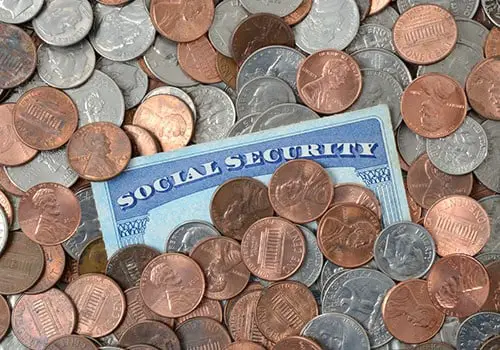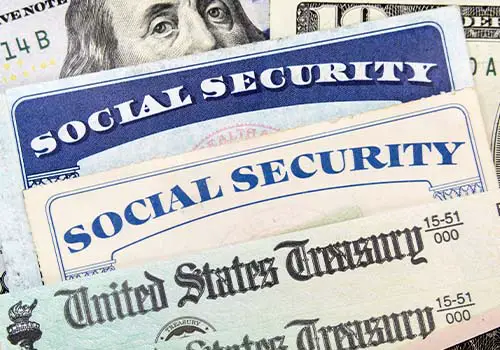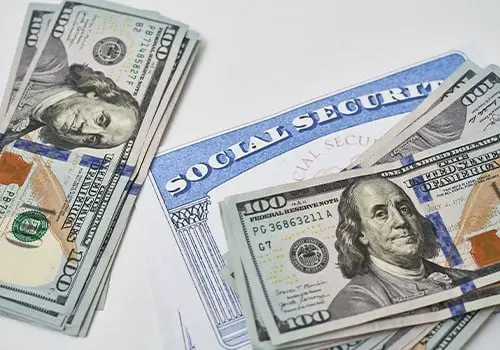If you owe someone money, there are ways that the court system can force you to pay your debt. Wage garnishment is one of those methods. However, you likely already know that Social Security benefits do not provide most people with enough money to pay for their monthly household expenses since Social Security payment amounts are pretty small.
Millions of Americans rely on these benefits to survive, so is garnishment allowed? The answer depends on who is attempting to garnish your benefits. If you are afraid your Social Security payments might be garnished, keep reading.
We will provide you with all the details about garnishing Social Security benefits, including who can and cannot, which types of benefits can be garnished, and how much of your monthly payment can be garnished.
The Basics Of Wage Garnishment
Before diving specifically into the garnishment of Social Security benefits, it helps to understand wage garnishment in general.
Court Order
If you owe a debt to a creditor, that creditor can take you to civil court and obtain a judgment against you. Once the judgment has been received, the debt collector can request a garnishment order against you. The garnishment is a court order that can work in several different ways.
Garnish Wages
The first is a garnishment order to your employer. This means the debt collection will occur automatically because your employer must withhold a certain amount from your wages and pay them directly to the court. The court will remit these payments to the creditor.
Garnishment generally happens when someone refuses to pay a debt, as a method the court uses to ensure the debt gets paid.
Garnish Assets
However, garnishment can also apply to other financials besides just your paycheck. Creditors and collection agencies can also garnish bank accounts, retirement accounts, and valuable assets, like cars or houses. Now you see why the repayment of unpaid debt is so important.
If you choose not to repay the debt, you might have a dire financial situation. In some cases, the court might even order your bank to withdraw the entire amount of the debt from your bank account at one time. The specifics of the garnishment order will depend on the type of debt, the type of creditor, the amount of the debt, and your finances.
KEY TAKEAWAYS
- A garnishment generally occurs when a creditor obtains a judgment in court for debts that are owed. The court order allows the creditor to garnish your wages or assets to repay the debt.
- The Social Security Act prevents commercial entities from garnishing Social Security benefits. However, federal government agencies may garnish your benefits.
- The federal government may garnish 15% of your Social Security payments for back taxes and up to 65% of your payments for alimony or child support.
Garnishment Of Social Security Benefits
So, how does garnishing monthly Social Security benefits work? Some people rely on Social Security as their sole source of income, so garnishing these benefits could be detrimental to them.
There are very few exceptions to the garnishment of regular wages from an employer, but there are quite a few exceptions to the garnishment of Social Security retirement benefits. The most significant factor that affects whether anyone can garnish those benefits is the type of entity attempting to do the garnishing. Here is what you need to know.
Garnishment By Commercial Entities
The Social Security Act prohibits commercial entities from garnishing your Social Security benefit payments. The Act bans garnishment by commercial entities of all Federal benefit payments. This includes Railroad Retirement Board benefits, veteran’s benefits, Social Security retirement benefits, Social Security disability benefits, and other benefits managed by the Social Security Administration.
A commercial entity is not associated with the Federal government. For example, a credit card company, local bank, or credit union that gave you a car loan cannot garnish your Social Security benefits to repay those debts.
In addition, there are also some special rules regarding the garnishment of your bank account by commercial entities. If your bank receives a garnishment order from a commercial entity, they must review your account history for two months before the order. If any Social Security benefits were placed into the account via direct deposit, the bank must protect the total amount of those direct deposits. While other funds in the account can be garnished by a commercial entity, the amount of your Social Security benefits cannot be garnished.
Garnishment By The Federal Government
Things are a little different when the creditor is the Federal government or a Federal agency. The Federal government is not exempt from garnishing your Social Security benefits.
Federal Taxes
One of the most common reasons for garnishment is the payment of back taxes.
- The IRS can garnish up to 15% of your Social Security payments for back tax payments, and the IRS doesn’t even need a court order to do this.
They can garnish those benefits entirely on their own. Retirement benefits in a 401k or IRA are also vulnerable to the garnishment powers of the IRS. One way to avoid garnishment by the Internal Revenue Service is by setting up a payment plan with them. As long as you make payments according to the agreement, they cannot garnish your benefits or accounts.
Alimony or Child Support
If you owe alimony or child support, you are also at risk of having your Social Security benefits garnished.
- Up to 65% of your benefits could be garnished to pay past-due alimony or child support.
In addition, your bank accounts might also be garnished and frozen to pay past-due taxes, child support, or alimony payments. In these situations, your financial institution is not required to review your accounts for Social Security direct deposits.
Federal Student Loans
Lastly, Federal student loans are another typical debt that many people owe. Social Security benefits can be garnished to repay these loans. However, there are some restrictions on this garnishment.
- A maximum of 15% of your Social Security benefits can be garnished to repay Federal student loans, and the first $750 of your benefits have an exemption from the garnishment.
For example, suppose you receive $800 per month in benefits. Since 15% of this could be garnished, up to $120 monthly could be taken to repay the loan. However, since the first $750 is safe from garnishment, only $50 per month would be garnished.
You should also know that this rule only applies to Federal student loans. Private student loans would follow the same rules as commercial creditors in the section above.
Must read articles related to Social Security Award Letters
- What is a Social Security Award Letter…how do you get a copy?
- How can I change my address with the Social Security office?
- Is there a way to get a replacement Social Security card?
- Learn the steps for setting up or changing your direct deposit.
- When will I receive my Social Security check this month?
Garnishment Of Social Security Disability Benefits
Many people wonder, “Can Social Security Disability be garnished?” The garnishment of Social Security disability insurance (SSDI) benefits follows the same rules as that of Social Security retirement benefits. SSDI benefits would generally be exempt from garnishment by most commercial creditors.
Commercial Creditors
So, if you owe a debt to a credit card company or from a personal loan, your disability benefits are generally safe. Similarly, your bank account could be garnished, but your bank would be required to review your account for any Social Security deposits. Those amounts would be exempt from garnishment.
Federal Agencies
However, Federal agencies can garnish your disability benefits. Generally, up to 15% of your benefits can be garnished to pay past-due Federal income tax, and the $750 exemption does not apply to past-due taxes.
The government can also garnish your disability benefits to pay past-due alimony, child support, or other non-tax debts. Up to 65% of your benefits can be garnished for child support or alimony.
TIP
Your Social Security benefits can be garnished to repay federal student loans. The garnishment amount cannot exceed 15% of your benefits, and the first $750 of benefits is exempt from garnishment.
Can My SSI Benefits Be Garnished?
So, what about Supplemental Security Income (SSI) benefits? Can SSI be garnished? Generally, your SSI benefits are entirely safe from garnishment. To qualify for SSI benefits, you must show a substantial financial need. Therefore, the garnishment of these benefits could result in extreme economic hardship.
Even if a creditor, like the Federal government, can garnish other Social Security benefits, they cannot garnish your SSI benefits. This law is in place to help protect the recipients of SSI benefits. Therefore, neither commercial creditors nor the Federal government or agencies can garnish your Supplemental Security Income payments.
Garnishment Of Other Retirement Accounts
The rules about garnishing retirement accounts are similar to the restrictions on Social Security garnishment, although different laws govern these situations.
Commercial Creditors
Your 401k is generally completely protected from garnishment when the creditor is a commercial creditor. The ERISA law protects your 401k from commercial creditors in this case. However, your IRA could be subject to garnishment depending on the balance in your account. The first million dollars in your account is exempt from garnishment per the 2005 BAPCPA law, but any balance over $1 million can be subject to garnishment by commercial creditors.
Federal Government
Again, regarding the Federal government, none of your accounts are safe. They have the ability and authority to garnish a 401k and an IRA. An IRA is more vulnerable, as the government can easily garnish those accounts.
However, a 401k is more protected, even for the Federal government. If your 401k is established under the ERISA rules, your account will be safe from garnishment — even for a Federal tax lien. One thing that helps protect your 401k is that your employer is also a part-owner of the account.
The Bottom Line
Your Social Security funds are generally safe from all commercial creditors, although they could be subject to garnishment by the Federal government. This garnishment could occur for past-due taxes, past-due spousal support payments, child support payments, and even Federal student loans.
Federal law generally limits the amount of your Social Security check that can be garnished to 15% of your payment amount, with the first $750 being protected. However, these limits do not apply to the IRS and the payment of back taxes.
If you have specific questions about these rules or feel your benefits have been improperly garnished, contact a local law firm for assistance.
Frequently Asked Questions
Generally, private debt collectors cannot take your Social Security benefits. A commercial creditor cannot garnish your Social Security benefits to repay credit cards, auto loans, medical bills, or similar items.
However, your Social Security benefits are at risk if the creditor is the Federal government. The government and other Federal agencies, like the IRS, can garnish Social Security payments for the repayment of past-due taxes, federal student loans, child support, or alimony payments.
The amount that may be garnished depends on the type of debt that is owed. Commercial creditors cannot garnish any of your Social Security checks. However, the Federal government can generally garnish up to 15% of your Social Security payments.
For certain debts, even more of your check can be taken. Up to 65% of your check may be taken for late child support or alimony payments if those payments are more than 12 weeks behind.
You will still receive your Social Security benefits, but up to 65% of those benefits might be taken to pay your late child support payments.
While Social Security payments are generally exempt from commercial creditors, the government can take those benefits to pay late child support or alimony. If the payments are more than 12 weeks late, the government can take up to 65% of your benefit amount to make the back payments.
Today, Most Social Security recipients have their benefits directly deposited into their bank accounts via direct deposit. Others choose to have the funds placed on a debit card. Because of how Social Security works, mailing a physical check is no longer an option.
Funds placed onto a debit card can still be garnished by the Federal government, even though they are not in a separate bank account. If the funds have been withdrawn as cash, the benefits will be challenging to garnish. However, as additional deposits are made into your account, those funds will generally be immediately garnished before you can withdraw cash.
You can find a Social Security Administration office near you by using our SSA office locator and searching for your closest location.






